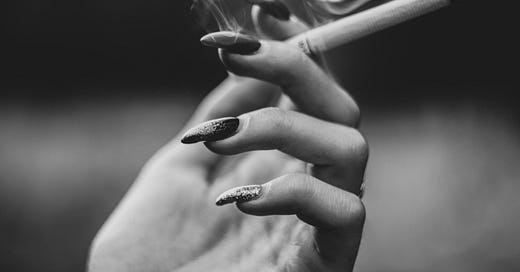How a menthol cig ban impacts our vices
The FDA would like to ban menthol cigarettes. What's this mean for our access to other vices.
This week’s topic was submitted by reader Daniel S. Feedback on content and suggestions for topics are encouraged. I’m so lonely, please write to me.
🚬🚬 Smoke em’ if you got ‘em? I dunno, I’m trying. Please subscribe, and follow me on Twitter @jarholst
FDA wields the ban-hammer
Bad news for any aspiring Joe Camels, Menthol ciggies may be on their way out. The FDA recently announced its proposed ban on menthol flavored cigarettes. Intuitively, the proposed ban arrives just after the 2009 ban on flavored cigarettes (other than menthol or plain tobacco). Mitch Zeller, director of the FDA's Center for Tobacco Products explains:
"Despite the tremendous progress we've made in getting people to stop smoking over the past 55 years, that progress hasn't been experienced by everyone equally...In the United States, compared to non-Hispanic White smokers, significantly fewer Black smokers support long-term quitting and Black smokers are more likely to die of tobacco-related disease than White smokers."
This justification reads well and the ban will likely do more good than harm. But, as we’ve covered before, it feels good to be bad. The ban therefore highlights a challenging predicament--the long term erosion of the availability of our sweet, sweet vices for the sake of an easy public health win.
There’s more to smoking than race (and a homemade table)
Zeller from the FDA isn’t wrong, the three leading causes of death among Blacks are heart disease, cancer, and stroke, all of which can be caused by smoking. Also, nearly 15% of all ‘Non-Hispanic Blacks’ are smokers in the US, second only to Native Americans at 21%.
Here are some other facts about smoking:
The left column shows the worse off someone is from the perspective of income, insurance, and mental health, the more likely they are to smoke. The right column indicates that taken as a nationwide cohort, Black people fit neatly within some of the largest cohorts of smokers in the country. Also, because the circumstances described in the column on the left are minimally defined as ‘unwanted’, if not something more severe, it’s also safe to assume most members of those cohorts would benefit from having improved circumstances.
Although I’m just a ding dong with a penchant for shitty illustrations, maybe I’ve found some correlation between the left column and the right column?
The FDA believes that in the first 13 to 17 months, this ban would create 923,000 smokers, 230,000 of which would be Black, to quit. Assuming this becomes even somewhat accurate, the menthol ban would provide a substantial benefit.
Despite needing regulatory approvals, the FDA can put forth a ban on menthol cigs without the help of Congress, part of why it’s an appealing move. Improving the circumstances of everyone in the table above, however, requires significant acts of Congress spanning everything from healthcare, taxes, public health, and education, just to name a few.
The song remains the same (Led Zep reference thx)
This is to say that whenever menthol cigs do get banned, the economic circumstances in the table above may still remain relatively unchanged. So too will the availability of vices besides menthol cigs.
What’s happened is the government’s gone for a quick win to the detriment of the long-term health of everyone and to the availability of our vices. Because our government has been mostly unresponsive to improving the circumstances of those residing in the bottom three quarters of the country’s wealth distribution, it must pursue whatever low hanging, minty fruit is out there.
Bear in mind, tobacco conglomerates still exist, still have global reach, and still want to make money. Altria, one of the globe’s largest tobacco product producers said in response to the ban:
“We share the common goal of moving adult smokers from cigarettes to potentially less harmful alternatives, but prohibition does not work...Criminalizing menthol will lead to serious unintended consequences.”
Further, this portends the future erosion of access to other vices such as marijuana, alcohol, gambling (craps is extremely fun and encourages cooperative play), and the burgeoning psychedelic market.
This leaves us at a long-term impasse. Tobacco companies, the largest of which have market caps over $150 billion, aren’t going anywhere anytime soon. Their imperative is to earn profit. Our imperative is to make the most out of life. For some, that includes doing something naughty every now and then.
Inequality grows and federal government continues to be unproductive—old problems will get worse and new ones will arise. The menthol ban may help, but it’s being used as cover for our inability to solve larger, systemic issues. As the easy fixes present themselves, we risk both losing sight of larger issues and losing some of the sweet, sweet, dopamine hits from our vices along the way.
🥰🥰 We love to feel good. It feels good to subscribe:
🐵🐵🐵 Monkey see, monkey do. Monkey forward this email to a friend or share?








